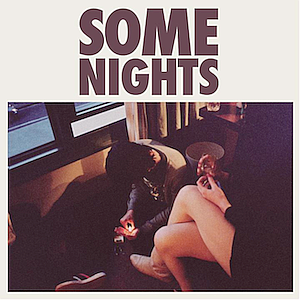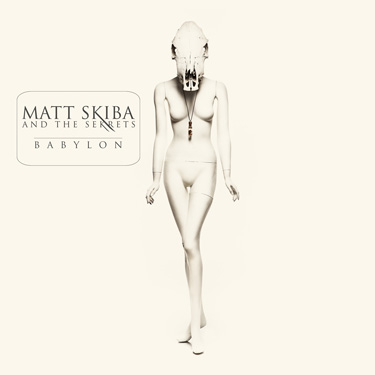 Timing is everything.
Timing is everything.
In Tally Hall’s case, timing meant delays. The multicolored tie-clad five-piece dropped the carnival pop bombshell Marvin’s Marvelous Mechanical Museum in 2005, remixed/recorded it for Atlantic records in 2008, and toured endlessly through the end of the decade. As such, they had to work sporadically on their follow up, Good & Evil, a record that arrives a full six years after their cult-like break out.
Talk about timing, that’s more like bad luck for their eager fans.
But despite the delays, Tally Hall have crafted bold follow-up with Good & Evil, a record that presents the band’s growth as well as their detailed song craft. Though more subdued (and less eclectic) than their debut, Good & Evil operates as a consistent pop record, one with clearly a defined mood that exhibits acoustic folk, shimmering keyboards, and sincere lyrics.
Things start out big: “Never Meant To Know” builds from acoustic strums to flittering synthesizers and shuffled drums, courtesy of Andrew Horowitz (Green Tie) and Ross Federman (Grey Tie). The accompaniment wraps around Rob Cantor’s (Yellow Tie) soft register as he delivers quaint couplets like, “Everything will fall away/To order from the disarray…” Though Tally Hall has always prided itself in its massive four-part harmonies, their musicianship has never felt so spacious and open, something that permeates throughout Good & Evil.
Yet after such a grand opener, one thing is drastically clear: The boys who once screamed about loving Potato Monkeys are mining a far different ideological nerve these days.
Much of Good & Evil is centered on the duality of extremes, the sources of conflict in our world, and what we’re willing to do for love. The Joe Hawley (Red Tie) penned “&” takes this to a literal sense over fuzzy bass work from Zubin Sedghi (Blue Tie) and shambling percussion, singing, “Stop & Go &/Hot & Cold &/John & Yoko/Dark & Light…” Elsewhere, the folky stomp and lilting keyboards of “The Trap” examines the elements that obscure our personal boundaries, “Whispered leaves on swaying trees and/Mysteries define/Summer nights of endless light/Remind us of the line that's/Yours & Mine…”
While this newfound lyrical cohesion really gives a voice to Good & Evil (and to the group’s overall songwriting), it does so by sacrificing Tally Hall’s famously whimsical sense of humor. Though producer Tony Hoffer helps glean warm clarity from the group’s instruments, he also doesn’t encourage them to push the zany heights they exhibited on Marvin’s. The music here comes across as expertly performed, but without the explosive rush and genre twisting that punctuated the group’s previous effort. A few more pinball machine freak-outs (“Turn The Lights Off”) and less by-the-numbers bubblegum pop (“Sacred Beast”) would have done wonders for the LP’s overall energy and momentum. Sadly, Good & Evil feels too comfortable (or at the very least, overworked) from a group that always seemed sonically elastic.
Yet when the album hits, it hits hard, and it’s on the more ornate tracks that the band’s magic really shines through. “Hymn For A Scarecrow” revels in a sleepy summer sway, complete with sweeping strings, syrupy psychedelic guitar, and sky-high whistles. Elsewhere, the album’s multi-movement closer “Fate Of The Stars” nicks the melody from Beethoven’s “Moonlight Sonata,” dressing it up with glitchy electronics, orbital harmonies, and Horowitz’s crystal clear ivories. Though multi-segmented songs are nothing new to Tally Hall, “Fate Of The Stars” reaches dizzying heights that some of their earlier work only hinted at, an impressive feat of growth for a second album.
Still, while Good & Evil is an easy record to appreciate, it’s a hard one to love.
Tally Hall’s experimentation leads them to some wonderful new sonic avenues, but Good & Evil seems labored. The group’s ability to dazzle listeners with simple transitions between big genre shifts has been eschewed for a more anchored sound. That ultimately takes a lot of energy out of the album, and out of the band’s performance.
Actually, Tally Hall’s old effervescence crops up only once on Good & Evil, on the expertly crafted “Misery Fell,” which features a thumping bass line, dipping and diving melodies, and some George Harrison-style lead guitar to boot. It’s the one time that the band feels unencumbered by expectations, even if they’re lamenting about heady concepts like faith vs. reason. When Cantor and Sedghi’s earnest voices break through the group’s quirky groove to deliver lines like, “The bad guys surrender their chemistry books at the fair/Oh well/Then frolic and take in the love that persists everywhere…” it works because there’s a looseness to it, a moment that feels earned rather than planned.
From its gestation period to its running time, Tally Hall’s second record was shaped by the idea of WHEN: When it peaks, and when it ends. It dictates the record’s energy, its construction, and how fans will ultimately react to it. In the end, timing defines Good & Evil more than anything else, which can be good or bad depending on when you started listening to Tally Hall.
The bigger question, however, is WHEN you’ll give this album a try.
Key Cuts: Never Meant To Know, Hymn For A Scarecrow, Misery Fell
Sounds Like: Abbey Road (The Beatles), The Broken String (Bishop Allen), A Night At The Opera (Queen)
Click on the artwork to sample Good & Evil for yourself!














2 comments:
I think people were a little too hard on this album. It was mature and beautiful. The fact that it wasn't as crazy as their first album is very trivial once you start to find all the complexities. I really love the review you've given though. It's a comforting happy medium.
Emma, thanks so much for your thoughts! I agree that people were too harsh on Good & Evil as a whole, but I also think Tally Hall's fanbase cut it maybe too much slack. Most records don't fall into the amazing/awesome category, and I think you really have to explore what the artist was trying to do. That said, I thought there were some great moments on G&E, but those moments came at the cost of consistency at times. It's a nice record; I still get chills when "Misery Fell" starts up, and I think "Hymn For A Scarecrow" is there best ballad this side of "Just Apathy."
Anyway, thanks for reading! Hope you'll stop by in the future!
Post a Comment